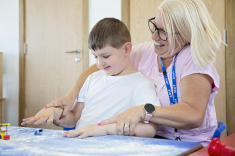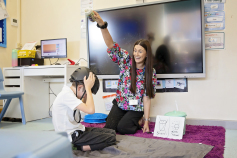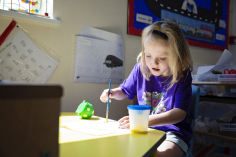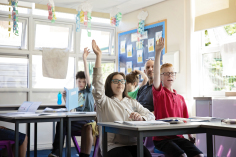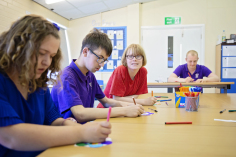KTS Curriculum Pathways
In May 2022, Ofsted described KTS leaders as ‘having a clear vision to provide all pupils with an exceptional education’
Leaders developed the curriculum and launched it across school in September 2018. The impact of the curriculum is monitored by subject leaders. Adjustments are made based on the experience of teachers delivering the content and the outcomes of monitoring and assessment.
When devising the KTS Curriculum, many different curriculums were researched and reviewed, from other SEND schools as well as mainstream schools. Agencies were also consulted including the speech and language service and occupational therapy service. Based on the information that was gathered, the KTS Curriculum was developed.
There are four pathways within the KTS curriculum as well as our Early Years Foundation Stage and Post 16 provision. These consist of;
Engagement Pathway
Pre-Formal Pathway
Semi-Formal Pathway
Formal Pathway
EYFS
On entry to school aged 3 (Nursery) or 4 (Reception) all pupils follow the Early Years Foundation stage framework. Pupils then move onto one of the four pathways. The characteristics of the learners on each pathway are as follows:
Engagement Pathway
Pupils on the Engagement pathway follow an educational offer which is often non-subject specific and instead starts with the child and their interests and development. Pupils on this pathway will have an Engagement Profile which is used to ensure that teachers are tuned in to what motivates and engages them to ensure that activities are tailored to each child. Many pupils on this pathway are pre-verbal or non-linguistic so communication is a key teaching focus. The aims within this pathway is to support learners to explore their environment and engage in play, develop positive relationships with others, become active within their learning and to develop skills to support them to be as independent as possible.
Pre-Formal Pathway
Pupils on the pre-formal pathway also follow an educational offer which is often non-subject specific and starts with the pupils, offering structure and routine. Pupils on this pathway will also sometimes have an Engagement profile to support their learning journey but they are beginning to attend to adult directed learning for longer periods of time and therefore will engage in some whole class/small group teaching. Pupils have emerging communication needs and require support to grow in confidence with this. The aims of this pathway are to support learners to engage with an increased level of adult direction within their learning, to manage their needs with increasing independence and to develop their relationships both with adults and peers.
Semi-Formal Pathway
Pupils on the semi-formal curriculum follow an adapted subject specific based curriculum (derived from the EYFS areas of learning). Pupils on this pathway can work for extend periods of time on adult directed tasks however they still need opportunities throughout the day to engage in play-based learning. The aims of this pathway are to support pupils with more formalised learning tasks, to develop pupils into being able to manage their own needs through increasing independence and develop the skills to keep themselves safe.
Post 16
Pupils continue to follow one of the four pathways (Engagement, Pre-Formal, Semi-Formal or Formal) through their post 16 provision. Depending on which pathway they follow, their education and routines will look different. Pupils on the Engagement and Pre-Formal pathways will continue to follow a non-subject based curriculum and will access their learning through a play and exploration-based delivery. Pupils will focus more heavily on the learning objectives appropriate to them through the Preparing For Adulthood (PfA) agenda, which focuses on Independent Living, Community Inclusion, Employment and Health as well as continue to develop their individual means to communicate and understand the world around them. For the majority of the pupils, paid employment or voluntary work may not be appropriate, so ‘Employment’ for pupils accessing the Engagement and Semi-Formal pathways will include learning about the services and professionals that are available to them. Pupils on these pathways will be working towards a qualification in Personal Progress, recognising their development in these PfA strands.
Pupils on the Sem-Formal and Formal pathways will continue with a reduced offer of National Curriculum subjects, in line with statutory guidance, but will also have the opportunity to develop their PfA skills, including Employment, through a vocational pathway. The vocational pathways offered are designed to build a range of employability skills, recognised and accredited through a qualification awarded at the end of the pupils' time at KTS. Currently, the pathways offered build on skills from customer service, catering, advertising, woodworking, land management and practical skills. In addition to this, pupils work on the key skills from the Skills Builder framework: Listening, Speaking, Problem Solving, Creativity, Staying Positive, Aiming High, Leadership and Teamwork. As well as the employability qualification, pupils will also work towards a qualification in Functional English and Maths.
Pupils in KTS1, 2, 3 and KTS+ follow a half termly topic on a 3 year rolling programme.
Topics were chosen for the first three years and reflect a selection of themes which support Understanding the World and Science subject areas and reflect the interests of the cohort of pupils.
For any more information on our curriculum offer, please get in touch with the school and speak our Curriculum Lead Practioner or a member of the Senior Leadership team.

